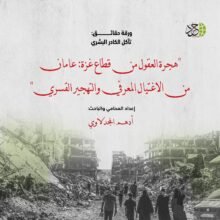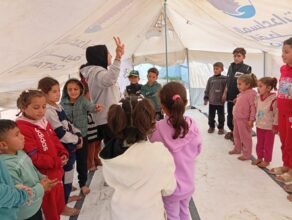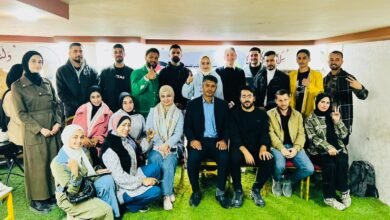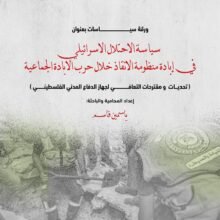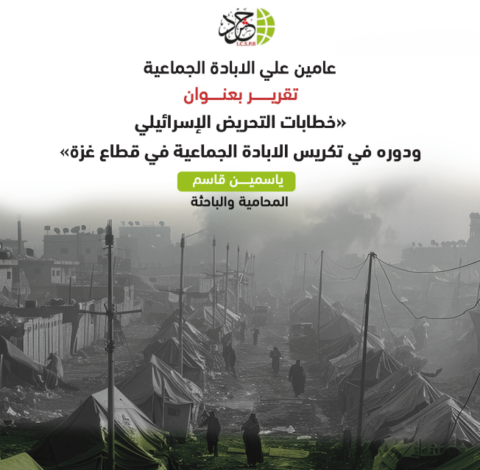
Two Years of Genocide in Gaza: “ICSPR” Documents an Official and Media Incitement System that Turned into Systematic Field Practices
Date: October 7, 2025
Press Release
Two Years of Genocide in Gaza: “ICSPR” Documents an Official and Media Incitement System that Turned into Systematic Field Practices
On the second anniversary of the Israeli aggression against the Gaza Strip, the International Commission to Support Palestinians’ Rights (ICSPR) issued a comprehensive human rights report titled:
“Israeli Incitement Discourses and Their Role in Perpetuating the Genocide in the Gaza Strip.”
The report, prepared by lawyer and researcher Yasmeen Qasem, documents the transition of inciting rhetoricfrom public statements made by Israeli political, military, religious, and media figures into large-scale field practices that, under international law, constitute acts of genocide, war crimes, and crimes against humanity.
The report concludes that direct and public incitement to kill, starve, and forcibly displace Palestinians—repeated since October 7, 2023 has ceased to be merely “hardline political language” and has become an integral part of Israeli political and military decision-making. It establishes a clear link between this discourse and a series of material actions, including mass killings, the imposition of deadly living conditions, enforced disappearances, targeting of infrastructure and civilian life, and the deliberate engineering of starvation, dehydration, and forced displacement and settlement replacement projects.
The report traces dozens of statements made by Israeli government officials, Knesset members, military and religious leaders since the early days of the war, which were filled with explicit calls to “erase Gaza,” “annihilate it from existence,” and “cut off all supplies until death.” These expressions according to the report did not remain mere rhetoric, but were translated into practical policies involving indiscriminate targeting of residential areas, cutting off water, electricity, and fuel, destroying hospitals and schools, and obstructing the entry of humanitarian aid.
ICSPR stresses that such incitement constitutes, under international law, a crime in itself in accordance with the 1948 Convention on the Prevention and Punishment of the Crime of Genocide, forming a solid legal basis for holding Israeli officials personally and criminally responsible for the crimes committed.
The report documents a long series of grave and organized violations committed by the Israeli occupation forces over the past two years, most notably:
-
Deliberate mass killings of thousands of civilians through indiscriminate bombardment of densely populated neighborhoods and repeated massacres that wiped out entire families.
-
Imposition of lethal living conditions, including cutting off water, electricity, and fuel, destroying sanitation networks and roads, closing border crossings, and preventing food and medicine from reaching civilians.
-
Targeting of the health sector by destroying hospitals and medical centers and killing doctors and paramedics, leading to an almost total collapse of the health system.
-
Deliberate attacks on educational institutions, places of worship, and media centers, aiming to erase the cultural and social fabric of Palestinian society.
-
Mass forced displacement of hundreds of thousands of families, with repeated attacks on displacement areas and UNRWA shelters.
-
Use of starvation as a weapon of war by closing crossings, preventing aid deliveries, and attacking humanitarian convoys.
-
Mass arrests and enforced disappearances of hundreds of civilians under inhumane detention conditions involving torture and cruel treatment.
The report affirms that these acts collectively amount to the material execution of genocide, intended to destroy the Palestinian people in whole or in part—whether through direct killing or the destruction of the conditions necessary for their survival.
ICSPR dedicates a full chapter to what it calls “media genocide,” documenting the widespread presence of hate speech and incitement across Hebrew digital platforms. This rhetoric was weaponized to mobilize Israeli public opinion against Palestinians, portraying them as existential enemies and “animalistic threats” that must be eliminated. The Commission also highlights the international failure to prosecute this kind of incitement, despite its role in creating the psychological and social climate necessary for carrying out the crimes.
Legally, the report reaffirms that Palestinians constitute a protected group under the 1948 Genocide Convention, and that what has occurred in Gaza clearly falls under the definition of genocide in Article II of the Convention, which includes killing members of the group, causing them serious bodily or mental harm, deliberately inflicting conditions calculated to destroy them, preventing births, or forcibly transferring children.
The report further references the International Court of Justice (ICJ) ruling of January 26, 2024, which found “reasonable grounds to believe” that Israel is committing acts of genocide in Gaza—thereby reinforcing the international community’s obligation to prevent and punish the ongoing crimes.
According to the report’s documentation:
-
Over 80,000 people have been killed, including tens of thousands of women and children.
-
More than 150,000 people have been injured, many with lifelong disabilities.
-
Over 85% of homes in Gaza have been completely or partially destroyed.
-
Around 80% of schools and hospitals are out of service.
-
Nearly two million people have been internally displaced, most living in catastrophic conditions without water, electricity, or sufficient food.
-
Widespread outbreaks of diseases and epidemics have been recorded due to the collapse of the health and sanitation systems.
The report urges the State Parties to the Genocide Convention to fulfill their legal and moral obligations by taking urgent measures to halt the crimes and hold perpetrators accountable before the International Criminal Court (ICC). It also calls on the United Nations to dispatch independent international investigation missions, establish safe and sustainable humanitarian corridors, and restore funding for UNRWA, which has been subjected to systematic defamation and targeting campaigns.
ICSPR emphasizes that continued international silence amounts to implicit complicity and undermines the integrity of the international legal system. The report calls for a clear political and legal stance that rejects impunity and restores the principles of justice and human dignity.
The report concludes that what has occurred and continues to occur in Gaza constitutes a full-fledged genocide resulting from a systematic campaign of incitement led by the Israeli state and its official institutions.
It asserts that these crimes will not be erased from collective memory, and that legal accountability is not a political choice but an international and moral duty to preserve what remains of the global conscience.
ICSPR recommends:
-
An immediate and comprehensive ceasefire, with special protection for hospitals, medical teams, shelters, and humanitarian convoys.
-
Unrestricted opening of crossings to allow the flow of fuel, medicine, food, and water through safe, depoliticized channels.
-
An independent international investigation into public incitement to genocide and its material acts, and referral of cases to the ICC.
-
Suspension of arms transfers and review of licensing systems for weapons used indiscriminately or unlawfully.
-
Protection and re-funding of UNRWA and other UN agencies from discriminatory measures to ensure unhindered humanitarian access.
-
Implementation of an early recovery program for public health, water, sanitation, housing, and education, prioritizing vulnerable groups (children, women, persons with disabilities).
-
Safe return of displaced persons to their homes and properties, with rejection of any projects promoting demographic replacement or “voluntary” forced migration.
-
Accountability for digital incitement, requiring platforms to enforce transparent and equitable policies against genocidal and hate speech, and addressing structural failures in moderation systems.


